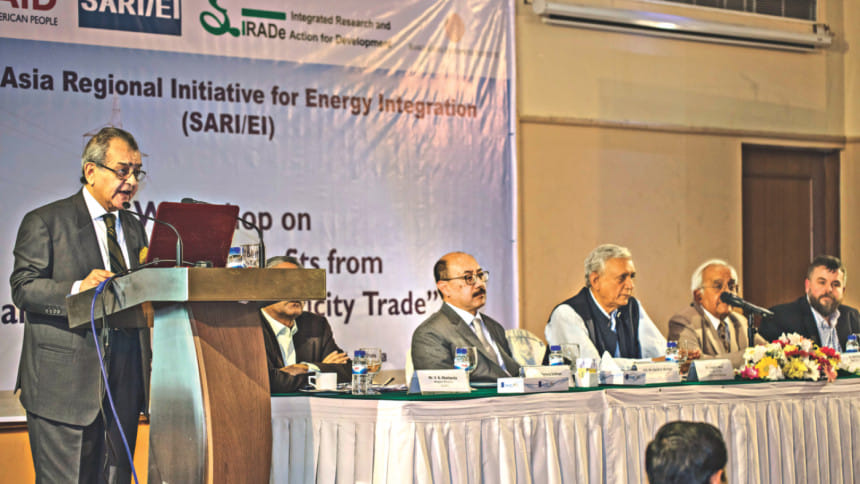Electricity trade win-win for India, Bangladesh: report

Electricity import from India is an economic option for Bangladesh as it is cheaper than all other options for the country confronting limited choices, according to a new report.
The report titled -- Economic Benefits from Bangladesh-India Electricity Trade -- said India and Bangladesh have identified infrastructure involving power and transport as potential areas to improve economic cooperation, leading to better political relations.
“This study substantiates the fact that electricity trade is a win-win option for both countries,” said the report.
The report was published at a workshop organised by the Bangladesh Enterprise Institute at Lakeshore Hotel in Dhaka yesterday.
The report was prepared by Delhi-based research think-tank the Integrated Research and Action for Development (IRADe) under the South Asia Regional Initiative for Energy Integration (SARI/EI) project supported by the USAID.
The study used three scenarios to quantify the power trade potential and macroeconomic benefits for both countries.
These are the reference scenario (imports through the current infrastructure); the Power Sector Master Plan (PSMP) 2016 (Bangladesh achieving 15 percent electricity import in its supply by 2040); and enhanced electricity import scenario of 30 percent in the total supply (Trade-30).
For 2012-45, the cumulated cost for power sector will stand at Tk 32.5 trillion for the reference scenario. This is Tk 35.7 trillion for the PSMP and Tk 27.6 trillion for the during the Trade-30 reference.
The trade-30 scenario needs less domestic power generation capacity and hence less investment not only in power generation capacity but also in fuel infrastructure development.
Enhanced electricity trade reduces fuel import for power generation, in particular that of gas, which has a more volatile market.
Bangladesh would be able to reduce carbon dioxide emissions significantly by adopting the enhanced import option, according to the report.
For India, export revenue earnings make Indian households gain in the form of increased consumption, which is higher when trade is higher.
The report said a 30 percent share of electricity may be within the limit of Bangladesh's way of ensuring energy security by restricting import dependence on a single fuel or source and diversifying the sources of power supply.
Trade with Bangladesh also gives India the opportunity to exploit its large hydro potential in the North-East, which could be evacuated through Bangladesh.
Bangladesh now imports 600 megawatts of electricity from India and more imports are on the cards.
Another 500MW will start to roll in from June this year, said Harsh V Shringla, high commissioner of India to Bangladesh.
He said Bangladesh was now importing 100MW of electricity from Tripura, but there was a huge scope to increase it significantly.
The high commissioner said among all the areas of bilateral cooperation, the power sector cooperation has seen faster growth. “We have seen some tangible cooperation,” he said.
Shringla said India was committed to partnering with Bangladesh's goal to ensure electricity for all by 2021.
He said India has agreed in principle to allow Nepal to use its land to pave the way for exporting electricity generated from hydropower to Bangladesh.
He said both Bangladesh and northeast India can benefit from the north-eastern region's huge hydropower reserves.
Farooq Sobhan, president of Bangladesh Enterprise Institute, praised the government's initiative that facilitated the import of power from India as an important step.
He said power trade with India, Bhutan, and Nepal could help Bangladesh achieve its ambitious targets set for 2021 and 2041.
In fact, regional cooperation in the power sector would help all participating countries, he said.
The former secretary said as Bangladesh was trying to diversify its energy sources, countries like India could be of enormous importance for Bangladesh.
“What is imperative is that this has to be structured on a win-win basis.”
Gowher Rizvi, international affairs adviser to the prime minister, said all countries in South Asia were suffering from an electricity shortage and power trade could help them overcome the shortfall.
In the concluding session, Nasrul Hamid, state minister for power, said Bangladesh would require $40 billion by 2020 to develop its power sector.
Kirit Parikh, chairman of the IRADe, Kerry Reeves, deputy director for environment and economic growth at the USAID Bangladesh, and VK Kharbanda, project director of the SARI, spoke in the inaugural session.
Mustafizur Rahman, a distinguished fellow of the Centre for Policy Dialogue, Mohammad Hossain, director general of the power cell, and Mamun Rashid, managing partner of PwC Bangladesh, were also present.

 For all latest news, follow The Daily Star's Google News channel.
For all latest news, follow The Daily Star's Google News channel. 



Comments